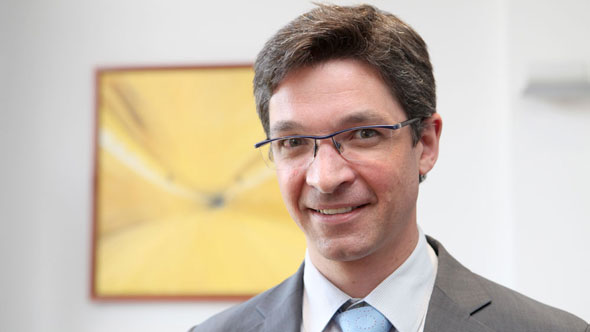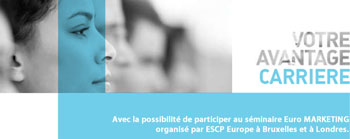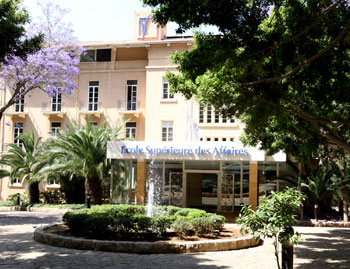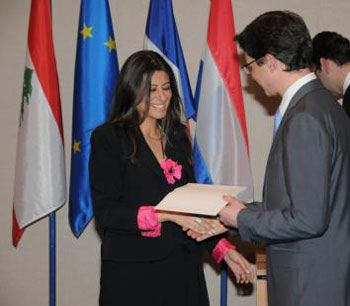Ecole Superieure des Affaires (ESA): Executive Education Programmes
ESA offers interesting programs of executive education. ESA really stresses double competencies because they consider those to be one of the keys of success. ESA is together with partners concentrating on business ethics and the responsibility of the CEO, of the Chairman, of the leaders, of the managers towards their own team, company and environment.
Interview with Stéphane Attali, President of Ecole Superieure des Affaires (ESA)

What are the unique, cutting-edge educational services that ESA offers that others still do not, in terms finance, for example?
One of the major aspects of our policy is innovation. Part of our mission is to work with companies and to anticipate their needs, especially in terms of training their teams and managers. One of our assets is this capacity to adapt international training and international standards in the field of education and professional training to the constraints of the countries where we are. This is especially important for this region of the Middle East, because you do not manage teams in Lebanon, Syria, Jordan, the United Arab Emirates or in Saudi Arabia as you do in Europe or in Northern America.
However, there are still international standards and international competencies, and we are using these skills and competencies through our faculty, our international education consultants and our partners to bring people here to adapt their knowledge and expertise to the needs of the companies we are working with here in the region. I say “in the region”, because we are based in Lebanon, but our objective is to be the leader in the economic field for the whole region. That is why we are currently establishing partnerships in Saudi Arabia, for example a programme in Islamic Finance with Effat University in Jeddah, which is doing very well.
We have a very strong partnership with L’Oreal for the whole Middle East region, which is a very important region for them, ranging from Morocco to  Pakistan and including South Africa. Once a year we have a group of 20 – 25 managers coming from all the countries belonging to this region to the ESA campus here in Beirut to be trained in a specific programme that was tailor-made for L’Oreal. It is a ten-day programme and is really haute-couture, meeting their standards, needs and challenges. L’Oreal has identified the Middle East region to be the next one billion consumer region, so they have to work on the human skills, human resources, on motivation and on management, and we are in partnership with them for this programme.
Pakistan and including South Africa. Once a year we have a group of 20 – 25 managers coming from all the countries belonging to this region to the ESA campus here in Beirut to be trained in a specific programme that was tailor-made for L’Oreal. It is a ten-day programme and is really haute-couture, meeting their standards, needs and challenges. L’Oreal has identified the Middle East region to be the next one billion consumer region, so they have to work on the human skills, human resources, on motivation and on management, and we are in partnership with them for this programme.
However, there are other institutions such as the AUB that are also claiming to be very good in innovation and to be a leading university in the Middle East. These are your main competitors. Can we say that you are indeed unique, that you are the best of the top-notch institutions out there?
Well, I think one of our major assets is this ability to have a really international faculty, because it is made out of visiting professors. Most of these visiting professors and consultants have been coming to Lebanon and to the region for 16 years, since ESA was created here for a partnership between France and Lebanon. In the partnership, one of the key success factors was this ability to attract the best professors to come and spend one or two weeks here, or a perhaps month, and to come to Lebanon or to other countries in the region once, twice or even three times a year to develop their knowledge, skills and expertise.
They bring with them their expertise and knowledge, and they can adapt their skills to the constraints of the region. This is unique. We have partnerships with the best European schools of management such as ESCP-EAP, HEC in Paris and the Rotterdam School of Management, which are ranked as some of the best in the Financial Times. That is one point. The second point is our degree programmes. All our degree programmes are delivered by both the ESA and our partner. For example, our executive MBA is in partnership with ESCP-EAP, which is one of the major business schools in Europe and in the world. Its executive MBA was ranked 15 in the Financial Times in 2011. Our alumni graduate from both ESA and ESCP-EAP. Wherever they go they can present their two degrees, the one from ESA and the one from ESCP-EAP.
There are many PhDs, but the quality of the PhD, the recognition you will get from it, will depend highly on the director you have and on the scientific committee that is in charge of your thesis. We have many ways to differentiate our MBAs, mainly to do with quality and international recognition.
This gives them a real asset in terms of recognition, in terms of networking, in terms of whatever is needed. This is unique, and it was made possible by the partnership between the Central Bank of Lebanon, the French Embassy here in Lebanon and the Paris Chamber of Commerce and Industry. To return to ESA’s mission, this is to bring international expertise to Lebanon, to allow Lebanese people in the first place, but also people from other regions to benefit from international expertise, education and training programmes here in Lebanon.
The MBA market is slowly becoming over-saturated. Are you still a believer in executive management education, given that there is a lack of engineers, or professionals in agriculture?
Very honestly, we do not feel this shift here. There are MBAs and MBAs. The MBA is a brand, but anyone can open a shop proclaiming that they deliver an MBA programme. There is very little control, especially quality control, of MBA programmes. This is where innovation and quality differentiate the different MBA programmes.
We have to strengthen our added-value and this is the way we are acting today: to promote programmes with the best quality. The difference lies in the topics we cover. You have international accreditation. Through our European partners we have free accreditation from AACSB, AMBA and EQUIS, because our partners have these accreditations and we have the faculty. It is comparable to a PhD.
There are many PhDs, but the quality of the PhD, the recognition you will get from it, will depend highly on the director you have and on the scientific committee that is in charge of your thesis. We have many ways to differentiate our MBAs, mainly to do with quality and international recognition.

Are you also following the trend of offering agricultural MBAs, as such commodities are now trendy?
We strongly believe in double competencies, so our MBAs are mostly addressed to engineers, for example, or people who have graduated from different environments. We really stress double competencies, because this is one of the keys of success. For example, an engineer without any managerial capacities is going to be a disaster in managing a team, unless they have very strong innate qualities and expertise. However, we strongly believe that you have to acquire these qualities and expertise, and you will acquire them through experience, through networking, through discussion and exchange with international experts and peers and so on.
You mentioned the financial crisis, and this is rather interesting, because for as long as the companies, banks and financial institutions were doing very well, no one thought about accusing the leaders of being a disaster for these companies. Today, now that we are facing a financial crisis, everybody is telling the business schools that they have a responsibility in this crisis, that they should have educated these leaders with more ethics and more responsibility. This is partly true, and the responsibility of business schools, especially international business schools is very important.
That is why here at ESA, and with our partners, we are concentrating on business ethics and the responsibility of the CEO, of the Chairman, of the leaders, of the managers toward their own team, company and environment, which is very important. This week we have two events in the executive MBA dealing with Corporate Social Responsibility. They are not all drinks, cheese and conferences; we are making the participants work on the environment in their company and on these CSR issues. We also have a partnership with Al Ahli Holding Group from the Emirates. They have designed their own CSR department and together we are launching ‘CSR in Action’ here in Lebanon. Once again, this is not only speeches, but is action on the ground to develop projects relating to CSR, which is very important. That is the role we want to play for society in the future.
Of course an important aspect of CSR is the connection. It is not just conferences and talking, it is actually putting what has been said into practice with the companies. Are you looking for more international companies to partner with you in order to develop their programmes, like CSR?

We have two families of services on offer. We currently have eight degree awarding programmes, ranging from the Master’s in Management to the DBA, the Doctorate in Business Administration, and we have also developed our executive education, which is really developing on a major scale and is why we are now working in partnership with the L’Oreal Group, with the Chalhoub Group and with other groups coming from different countries based in the Emirates, Qatar and Saudi Arabia as well.
Although we are expanding, we always remember that we as ESA were created here in Lebanon, to contribute to re-establishing Lebanon as a leading country in the region, especially in the field of education and training. We want to attract people from all the countries around to Beirut and to promote a sort of academic tourism with very high international standards.
Now you are touching on an important subject, which is education Lebanon. When we interviewed the other institution, they mentioned that the Ministry has awarded a lot of accreditation and now there are around forty universities and forty degrees around, which is not helping the market, as they said the quality of the accreditation that is given out to the new institutions is not very high. What is your taken on this?
Very honestly, I do not believe that. Of course the Ministry of Higher of Education has a very important role and they are working very hard in the environment which is given to promote quality and to set standards. However, in Europe for example, we have spent many years to establish standards. You need to ask who has established the educational standards, especially in business schools. It is the market. The market has established the standards, not the governments. We strongly believe that the market is establishing the standards here in Lebanon as well as in other countries.
Today’s students, whether young or more experienced, are consumers. They have all the means they need to have their own opinion about the programme they want to follow and the business school they want to study at. They are free to choose. Lebanon is a free market. They can base their decisions on international accreditation, by studying the faculty operating the degree, inquiring about the business school’s reputation and its network of alumni – where are they working and what are their salaries and so on. I do not really believe in the problem of having more and more universities. The best will survive and the others will disappear; this is the law of the markets.

Everything looks nice and rosy, but in every business there are challenges and problems. What are you particular challenges? Are you fully satisfied with your student enrolment and with your international networking? What is your personal struggle, where would you like to take the institution? What are you trying to change?
One of our major challenges is toward our students, because we do feel that we have a responsibility towards them. We want to strengthen their behavior and their soft skills. Behaviour is a very important aspect of the education, and we do feel that not enough strength is given to behavior throughout the education of students, especially here in Lebanon, but also in other countries. This is going to be a major challenge for us here as ESA, but in partnership with other universities, and we are developing partnerships with universities here in Lebanon, especially with the Lebanese university, which is the only public university in Lebanon. Behaviour is a major point, and of course Lebanese students are relatively good at these kinds of soft skills compared to students from other countries, but we still have to work on that and develop their behavioral competencies.
When you say behavior, this is a very wide term. What aspects of behavior are you trying to develop?
‘Behaviour’ is motivation, it is ethics, it is the capacity to interact with others, to work in teams, to have a stable attitude, to be an adult in a company. This is not just experience; you also have to work on it. You have to be trained in it and you have to understand what your personality is, because although you cannot change your personality, you can change your behaviour in a group. It is part of social skills.
The concern is that modifying a person’s behaviour is a job that is done by your family, your upbringing and how you interact with others at school. It is a very long process, and when the executive MBA is only run at weekends, because the executives do not have much time, how efficient is it at the end of the day?
This is the challenge, and I think this is why we are here. Anyone can deliver technical skills such as finance, control or HR, which is why we emphasize social skills. We not only have modules that run for two or three days a month, but also four blocked weeks a year in the executive programme to work on behaviour and to train the students. The training takes place throughout both years of the programme. You cannot change the students’ personalities, but you can change their behavior just by making them understand how and why they react with others in this way or that way. We are developing this kind of training with in-house companies, working with a manager and his team, just to make the team-building better. It is a challenge, but we have the experts to do that, and we have the international expertise in particular.
What has been the feedback on this? Is it really working?
Not only is it working, but it is in demand. I think for anybody coming to attend an executive MBA or even an MBA programme today, it is a prerequisite. They want to have access to this kind of opening, to this kind of transformation, and education and a training programme is not just training, it is also a transformation process. The kind of skills the students will acquire will be a major asset for them. This will make the difference. The feedback we have been getting has been really amazing. Working on negotiation skills, working on interaction, working on interdependence really makes a difference.
I think we have covered a lot of topics. Is there anything you would like to stress, perhaps particularly relating to the executive education? Can you give us a message saying why anyone should choose ESA? There are a lot of institutions out there, including Harvard and Yale, so you are facing tough competition in attracting executives, because they have the money and they have a choice.
I would say the choice should be to stay in the region, where you will have the access to the best experts in the world and to the best networks. We bring this kind of expertise that you will not find on a regular basis. So for executives coming from the region, it is quite easy to come to Lebanon, which is also a friendly country, and it is not too far. Here you will be able to meet the consultants and experts from abroad and that will love coming to Lebanon, which is why they come here on a regular basis. They are almost revelatory because of their knowledge, their studies and their research. You cannot find this elsewhere. It is here in Lebanon, and specifically, at ESA.
I have some descriptive questions now. Has your student enrollment grown at all?
Now, if you just think about what that represents, where bits and bytes go beyond the simple screen, imagine the opportunity of creating concepts, products and experiences around that. In that regards, we are gearing up to be a great leader in that domain.
In terms of numbers of students…
We have around 500 students. Most of them are professionals; for the executive MBA we require between seven and ten years of professional experience. When they come to ESA they become students again, and they do appreciate this. This number is slowly growing, and where we are growing the most is in the executive education department. We are in constant growth here because we are constantly expanding that network of companies we are working with.
How many companies are you working with?
I would say at least 20 to 30. We are developing specific, tailor-made training programmes for them, ranging from very technical fields such as Islamic Finance or Control to more soft skills such as intra-management or coaching. In coaching we have developed a specific programme called ‘Executive Committees and Managers’.
And how many members do you have in your faculty, both permanent and visiting?
We have around 180 professors coming to ESA at least three or four times a year and developing research and training as well as modules with our students here.
But you do have some stable, permanent faculty staff, don’t you?
We consider the visiting professors as our faculty. This is the way ESA works.
What about your PhD programme?
We do not have a PhD programme. We are developing a DBA, which is a Doctorate in Business Administration. We believe that PhDs are much more for those who opt for an academic career, and the DBA, which is becoming an international standard with the AMBA accreditation, is much more focused on professional issues and this programme. It is designed for professionals, for chairmen and managers who want to take their experience and transform it into standards and who want to participate in the design of education and professionalism in the region. It is therefore a very different way of seeing education and doctorates. We are developing this programme with the best universities in France, with high-standard scientific committees and with all the accreditation, so we believe that this is innovation.
At which stage of the development are you? Do you already have students on this programme?
Not yet. We are launching the programme at the end of the academic year in July, and it will start in October.